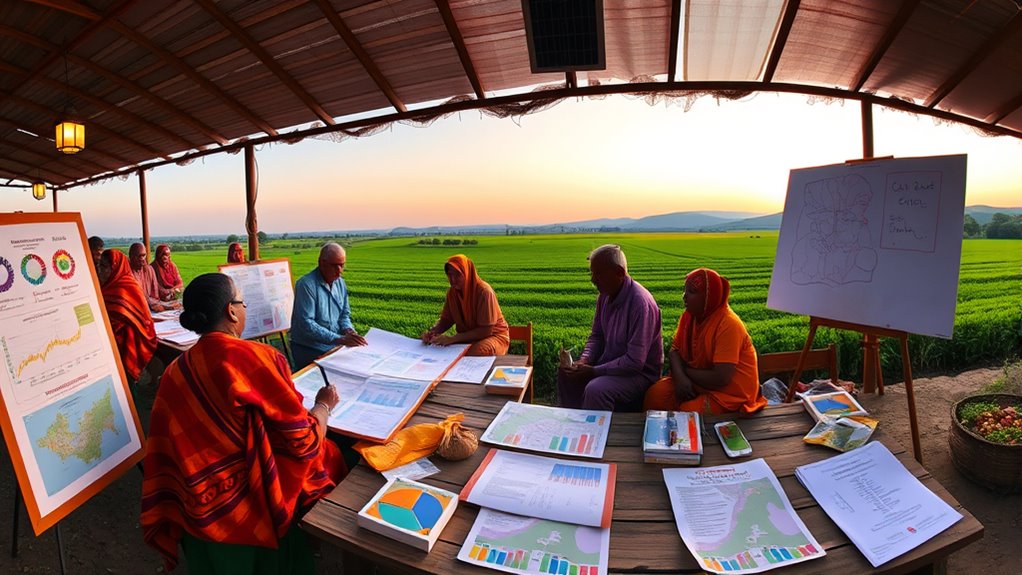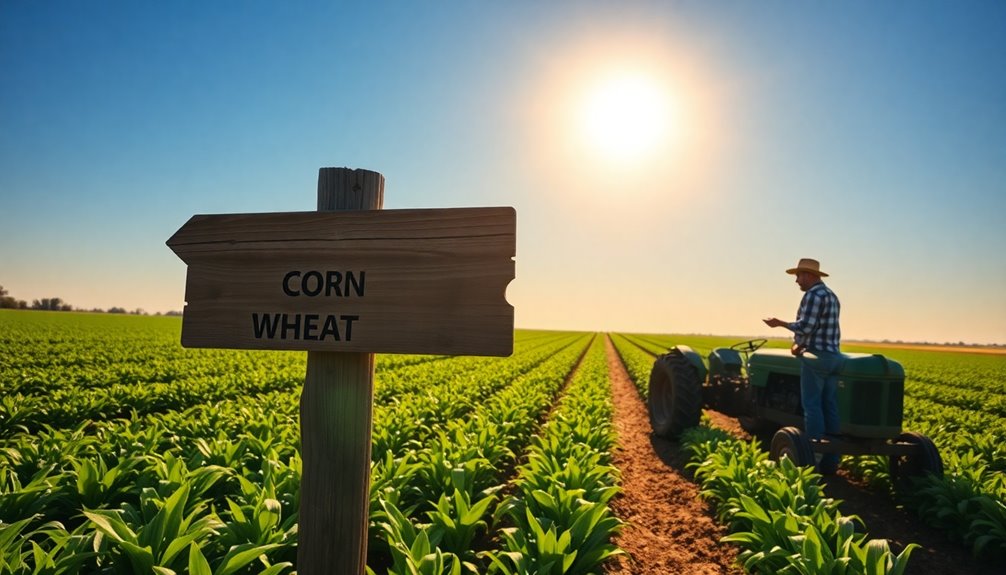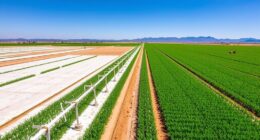To prepare for CAP 2028 negotiations, understand the new focus on sustainability, fairness, and competitiveness, which will shape funding and environmental rules. Stay informed by following official updates, participating in consultations, and engaging with industry groups. Make sure to adapt your farm practices, explore new markets, and adopt sustainable techniques. Building strong relationships with policymakers and advocacy groups will boost your influence. Continuing to learn more will help you navigate upcoming changes effectively.
Key Takeaways
- Stay informed on CAP 2028 proposals through official sources, consultations, and industry updates.
- Identify key issues like funding, environmental standards, and market access to craft effective advocacy messages.
- Build relationships with policymakers, farm groups, and stakeholders for unified negotiation efforts.
- Prepare to adapt practices and diversify income sources in response to evolving regulations and market trends.
- Participate actively in consultations and discussions to influence policy decisions and ensure fair support.
Understanding the Goals and Framework of CAP 2028

What exactly are the core objectives and structure of CAP 2028, and why are they important for your negotiation strategy? CAP 2028 aims to modernize the Common Agricultural Policy, focusing on sustainability, competitiveness, and fairness. Its structure includes targeted financial support, environmental schemes, and rural development programs. Understanding these goals helps you identify what the EU prioritizes, so you can align your proposals accordingly. The framework emphasizes environmental protection, climate action, and social fairness, which directly impact your farming practices and funding opportunities. Knowing the policy’s core objectives allows you to craft strategic arguments, highlight your contributions, and advocate effectively. This clarity gives you a stronger position during negotiations, ensuring your interests are well-represented within the broader policy landscape. Additionally, familiarity with brewing methods used in coffee can inspire innovative approaches to sustainability and community engagement in your projects.
Key Issues Impacting Farmers in the Negotiations

Understanding the goals and framework of CAP 2028 helps you see what the EU prioritizes, but it’s equally important to recognize the key issues that directly impact farmers during negotiations. One major concern is funding allocation, as farmers want clear, fair support that sustains their livelihoods and adapts to environmental changes. Environmental regulations are also essential; stricter standards could increase costs but are necessary for sustainability. Market access and fair competition remain pressing issues, affecting your ability to sell produce at fair prices. Additionally, measures around modernization and innovation, like digital tools and sustainable practices, are critical for competitiveness. Being aware of these issues prepares you to advocate effectively and ensure that your needs are addressed in the final decisions. A comprehensive understanding of farmhouse bedroom design can also inspire strategies for creating supportive, comfortable spaces that enhance well-being during demanding negotiations.
How to Stay Informed and Engage With Policy Makers

To effectively influence policy decisions during CAP 2028 negotiations, staying informed and engaging with policymakers is essential. You should regularly follow official government sources, industry publications, and trusted news outlets to keep up with updates and debates. Attend public consultations, workshops, and farmer forums to voice your concerns and ask questions directly. Building relationships with local representatives and agricultural organizations can also help you stay connected and ensure your voice is heard. Use social media platforms to engage with policymakers and share your perspectives. The more active and informed you are, the better you can respond to developments and advocate for policies that benefit your farm. Staying aware of projector technology trends can also help you understand how technological advancements might influence agricultural policies and funding programs. The more consistent and engaged you are, the better you can respond to developments and advocate for policies that benefit your farm. Regular engagement keeps you connected and prepared for meaningful participation.
Strategies for Effective Advocacy and Representation
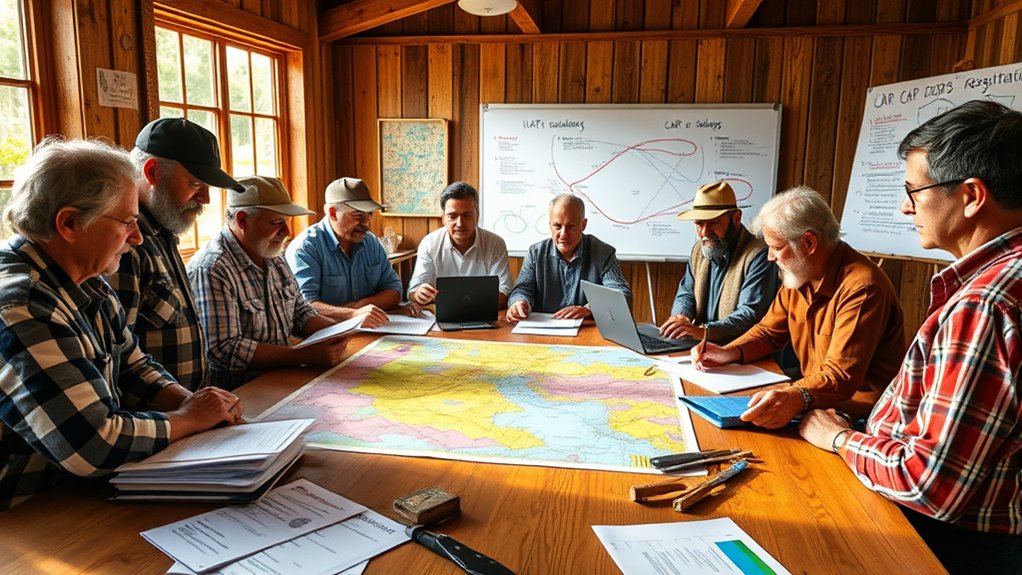
Effective advocacy and representation require clear, strategic actions that amplify your voice during CAP 2028 negotiations. First, identify key issues affecting your farm and develop focused messages that highlight their importance. Build relationships with policymakers and industry stakeholders to strengthen your influence. Attend public consultations, submit written comments, and participate in discussions to ensure your perspective is heard. Collaborate with farmer groups or associations to present a unified stance, increasing your impact. Stay consistent and persistent in your messaging, and be prepared to provide data or examples that support your position. Active engagement and well-organized advocacy efforts can shape policies that benefit your farm, ensuring your concerns are prioritized during CAP 2028 negotiations. Cultivating a growth mindset can help you adapt your strategies and overcome challenges throughout the advocacy process.
Preparing Your Farm for Future Changes and Opportunities
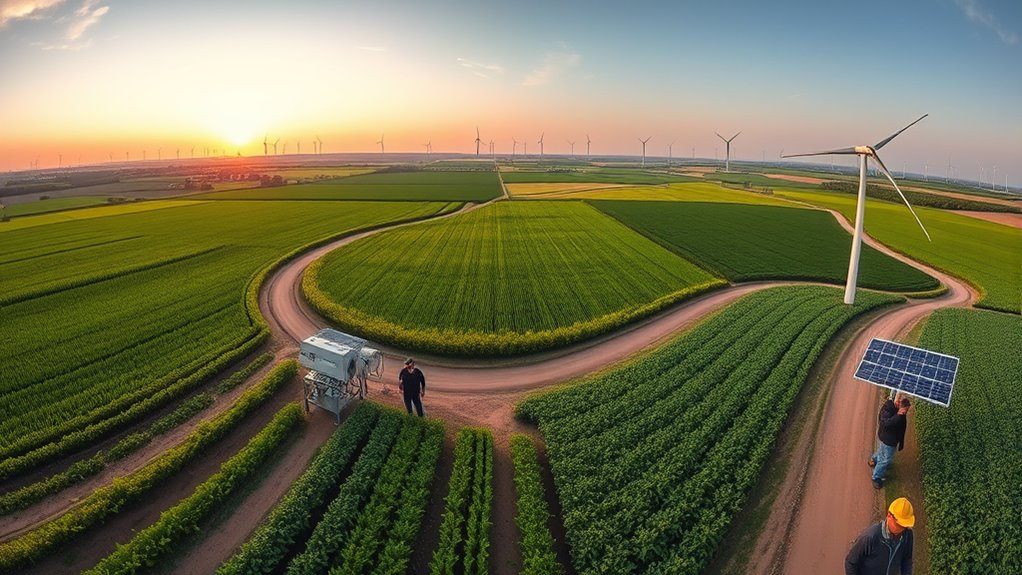
Preparing Your Farm for Future Changes and Opportunities involves proactive planning and adaptability. You need to stay informed about policy shifts, market trends, and technological advances. Diversify your crops and income sources to reduce risks and capitalize on emerging markets. Invest in sustainable practices to meet future regulations and consumer preferences. Consider upgrading equipment or adopting new farming techniques that improve efficiency. Use the table below to identify key areas for preparation:
| Area | Action | Benefits |
|---|---|---|
| Policy & Regulations | Monitor updates and participate in consultations | Stay compliant, influence policy |
| Technology | Adopt precision farming tools | Increase yield, reduce costs |
| Market Trends | Explore new crops and markets | Expand revenue streams |
| Sustainability | Implement eco-friendly practices | Ensure long-term viability |
| Knowledge & Awareness | Stay informed about shelf life and storage of products | Prevent spoilage and maintain product quality |
Frequently Asked Questions
How Will CAP 2028 Affect Different Types of Farms Differently?
CAP 2028 will impact your farm differently based on its size, type, and location. If you’re a small or organic farmer, you might benefit from targeted support and eco-friendly incentives. Larger, conventional farms could face stricter regulations and funding shifts. It’s crucial to stay informed about policy changes, adapt your practices accordingly, and engage in negotiations to guarantee your farm’s interests are well-represented and protected during this shift.
What Financial Assistance Options Are Available During CAP 2028 Transitions?
During CAP 2028 shifts, you can access financial assistance like direct payments, grants, and subsidies designed to support farmers. These options aim to ease the changeover, especially for small or vulnerable farms. You should also explore national programs or regional schemes that might offer additional aid. Staying informed about eligibility criteria and application deadlines guarantees you maximize your support during this transition period.
How Can Small-Scale Farmers Effectively Influence CAP Negotiations?
You can effectively influence CAP negotiations by actively engaging with policymakers and joining farmer associations. Share your experiences and concerns through public consultations and advocacy campaigns. Stay informed about policy proposals and participate in consultations early. Building alliances with other small-scale farmers strengthens your voice. Use social media and local events to raise awareness. Your consistent, informed input helps shape policies that support small farmers during CAP 2028 progressions.
What Environmental Standards Will Farmers Need to Meet Under CAP 2028?
Under CAP 2028, you’ll need to meet stricter environmental standards focused on sustainability. This includes adopting eco-friendly practices like reducing chemical use, conserving water, and promoting biodiversity on your farm. You’ll also have to demonstrate compliance through monitoring and reporting. Staying informed about these requirements is essential, so regularly check official updates and collaborate with local agencies to guarantee your farm meets all new standards and benefits from available support programs.
How Will CAP 2028 Impact Farm Succession Planning and Ownership?
CAP 2028 will reshape your farm’s future, making succession planning more vital than ever. As policies tighten, you’ll need clear ownership strategies to guarantee smooth transitions and maximize benefits. You might face new regulations that impact estate transfer taxes or land leasing. Staying proactive now can help you navigate these changes, safeguarding your legacy and maintaining farm viability amid evolving rules. Prepare early to turn potential challenges into opportunities.
Conclusion
As you navigate the CAP 2028 negotiations, think of yourself as a skilled sailor steering through shifting tides. Staying informed and engaged helps you adjust your sails to harness favorable winds and avoid storms. By actively advocating for your farm’s needs, you become the captain of your future, charting a course through uncertain waters toward new opportunities. Remember, with preparation and resilience, you can steer your farm confidently into the promising horizon ahead.

